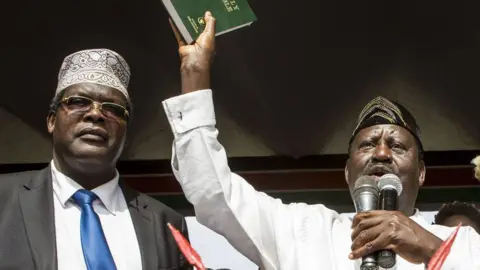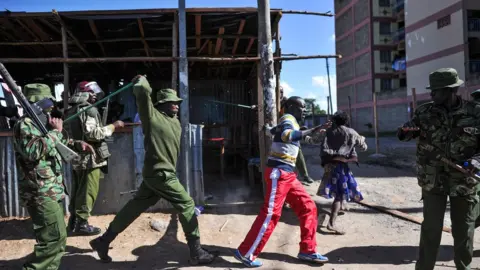Kenya deports Miguna Miguna over Odinga 'swearing-in'
 Getty Images
Getty ImagesKenya has deported opposition supporter and lawyer, Miguna Miguna, following his role in the unofficial swearing-in of opposition leader Raila Odinga as "the people's president".
Mr Miguna has boarded a flight to take him to Canada, where he is a citizen.
His departure came after he was charged with treason-related offences.
Kenya's Chief Justice David Maraga has criticised the government for not following court orders to release Mr Miguna on bail.
"Compliance with court orders is not optional, but a constitutional obligation," Mr Maraga said in an unprecedented statement.
The government had earlier ignored court demands to lift a suspension on Kenyan TV channels, which it took off-air ahead of Mr Odinga's "inauguration."
For more on this and other stories, visit our Africa Live page
Mr Odinga boycotted last year's election re-run, saying it would be rigged in favour of President Uhuru Kenyatta.
He and his supporters consider him the rightful leader of Kenya.
What was the 'swearing-in' about?
In August, Mr Odinga ran for president against Mr Kenyatta.
He lost, but the country's Supreme Court said the election wasn't transparent, prompting a re-run in October.
Mr Odinga declined to enter this race, saying nothing had changed, and Mr Kenyatta won 98% of the vote, with only 39% turnout.
But after letting Mr Kenyatta govern for two months, he held his unofficial swearing-in ceremony at Uhuru Park in Nairobi on 30 January.
During an oath signed and conducted by Mr Miguna, Mr Odinga declared himself "the people's president".
How did the government respond?
In a word, badly.
President Kenyatta took three TV channels off air, with only two resuming broadcasting this week - and only on subscription services, not free-to-air.
On 31 January, police arrested TJ Kajwang, a lawyer who witnessed the ceremony.
Two days later, they broke down Mr Miguna's door in a dawn raid and also detained him.
Mr Miguna says he was then kept "in unlawful incommunicado detention for five days under the most horrendous, cruel and inhumane conditions imaginable".
On Tuesday, he appeared before a court outside Nairobi and was charged with "being present and consenting to the administration of an oath to commit a capital offence, namely treason".

Is Kenya turning into a police state?
Analysis: Wanyama Chebusiri, BBC Africa, Nairobi
Kenya is a deeply divided country at the moment and there are real fears of a resumption of the violence which followed last year's disputed elections.
 Getty Images
Getty ImagesWhile some saw Raila Odinga's unofficial swearing-in as little more than a publicity stunt, it has certainly attracted the attention of the government.
Critics say that its reaction has been over the top and that the country is slowly turning into a police state - with the arrest of opposition supporters, shutdown of TV stations and court orders being disobeyed.
The government, however, insists that the "swearing-in" was tantamount to treason and so could not be ignored.
But what it has not done yet is arrest Mr Odinga, as this would inevitably lead to confrontation between his supporters and the security forces.

What has happened to Mr Miguna?
The court had ordered that Mr Miguna be bailed following his hearing, but this did not happen.
Videos posted on social media showed him on board a flight to Amsterdam, from where he was due to connect to Canada.
Allow X content?
His departure angered his supporters who questioned what right the government had to deport Mr Miguna, who was born in Kenya.
Under Article 17 of the Kenyan Constitution, a person born in Kenya can only have their citizenship revoked if it was acquired by fraud, if they or their parents were already a citizen of another country, or if the person was older than eight when they were found in Kenya.
The government has since issued a statement saying that under the old constitution, Kenyans couldn't hold dual-citizenship meaning that Mr Miguna's acquisition of a Canadian passport in 1988 cost him his Kenyan nationality.
Although Mr Miguna successfully applied for a Kenyan passport in 2009, the government says this application was invalid since he didn't declare his Canadian citizenship.
The government added that Mr Miguna never applied for Kenyan nationality once the constitution changed in 2010 to permit dual nationality.
Mr Miguna is yet to respond to this explanation.
Earlier he had said he never renounced his Kenyan citizenship and would never do that.
"The constitution is crystal clear: no one can invalidate or purport to cancel the citizenship of a Kenyan born citizen," he added.
Who is Miguna Miguna?
Mr Miguna is the leader of the National Resistance Movement, a civil disobedience organisation linked to the opposition.
On 30 January, the government declared it an organised criminal group.
It wasn't Mr Miguna's first brush with the law.
In 1988, he was arrested by the then government of President Daniel arap Moi.
Mr Miguna then went to Canada where he claimed political asylum, according to his website.
He only joined Mr Odinga's team in 2017, after falling out with him five years earlier.
Five years earlier he had published a book called Peeling Back the Mask in which he criticised Mr Odinga's leadership as prime minister.
In 2013, he backed Mr Kenyatta in the presidential elections.